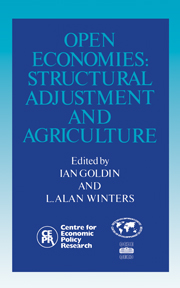Book contents
- Frontmatter
- Contents
- List of figures
- List of tables
- Preface
- Acknowledgements
- List of conference participants
- 1 Introduction: from macro to maize
- Part One Open economy analysis
- Part Two The small country assumption and trade reform
- Part Three Risk and adjustment
- Part Four Government's role
- 11 Infrastructure, relative prices and agricultural adjustment
- Discussion
- 12 Structural factors and tax revenue in developing countries: a decade of evidence
- Discussion
- 13 International dimensions of the political economy of distortionary price and trade policies
- Discussion
- Index
12 - Structural factors and tax revenue in developing countries: a decade of evidence
from Part Four - Government's role
Published online by Cambridge University Press: 04 August 2010
- Frontmatter
- Contents
- List of figures
- List of tables
- Preface
- Acknowledgements
- List of conference participants
- 1 Introduction: from macro to maize
- Part One Open economy analysis
- Part Two The small country assumption and trade reform
- Part Three Risk and adjustment
- Part Four Government's role
- 11 Infrastructure, relative prices and agricultural adjustment
- Discussion
- 12 Structural factors and tax revenue in developing countries: a decade of evidence
- Discussion
- 13 International dimensions of the political economy of distortionary price and trade policies
- Discussion
- Index
Summary
Introduction
The decade of the 1980s was not an easy one for the majority of the developing countries. Many of them experienced high rates of inflation, difficulties with their balance of payments, slow growth rates, and other problems. These problems caused significant structural changes in the economies of the developing countries. In some cases, countries became more open; in others, they restricted imports to generate trade account surpluses to service the debt. The importance of agriculture was recognised and policies that tended to retard its development began to be changed. The import substitution model began to be replaced by a model that attached more importance to international market forces.
A common element in adjustment programmes was the perceived need to bring public finances under control. Since political (and, at times, administrative-institutional) reasons make expenditure control difficult, many adjustment programmes have come to rely on tax increases. Another factor causing tax increases during the 1980s was the need for many countries to mobilize resources to service their public debt. As far as foreign debt is concerned its servicing requires two surpluses, one in the trade account and the other in the primary budgetary account (see Reisen and van Trotsenburg, 1988). The higher is the servicing, the larger must be the primary surplus. The debt situation itself thus created calls for tax increases.
- Type
- Chapter
- Information
- Open EconomiesStructural Adjustment and Agriculture, pp. 267 - 285Publisher: Cambridge University PressPrint publication year: 1992
- 71
- Cited by



